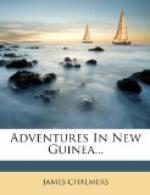I landed with them, and went up through the villages, then returning to the boats we were told to remain there. Shortly three pigs were brought, and our return presents of uros, etc., were carried off. Bob’s calabash has brought him a host of friends. Piri is with his friends at one end of the village, and in the opposite I am to reside in my friend Rahe’s dubu. Semese is his father, and a very old man. The number of old men and old women and children is astonishing. No enemy dare come near their villages, and their houses have never been burnt down. The Boera chief—a capital fellow to have—speaks this dialect very fluently. Our people at first were very much afraid, but soon settled down, and are now roving about.
Suddenly the war-horn was heard blowing—not the pig-horn, so often heard on the coast. I wondered what was up, but it turned out to be only the youth training. Two new double canoes came down the river with large complements of paddles, all young lads, gaily dressed. A number of young men, painted and extravagantly dressed, have been here; they lately killed some Moveavans, and are hence greatly admired by old and young.
I had to take off my boots and socks, and allow my feet to be admired, also to show off my chest. All shout with delight, and every new arrival must have a look. The sun was frightfully hot. Some men were fishing on the breakers; they had a long post, with a cross-bar, on which they stand, fixed in the sand, head covered with native cloth, and bow and arrow ready.
A number of people came in from Vailala. They wish I would go down with them, but it is too late to go so far in an open boat. I have had another meeting with the leading men, and I think all is now peace. My friend Rahe seems a great personage, with relatives innumerable. He wants to know if I would like to be alone in the dubu; only say it, and all the men will leave. I prefer them remaining, and I will make myself comfortable on the front platform.
In the evening, men and women—I suppose they would say “elegantly dressed”—bodies besmeared with red pigment, croton and dracaena leaves, and feathers of various birds fixed on head, arms, and legs, paraded the villages. At present all move about armed, and in this establishment bows, bent and unbent, and bundles of arrows are on all sides.
Rahe has just been to me to ask for boat medicine.
“What do you mean, Rahe?”
“I want you to give me some of that medicine you use to make your boat sail.”
“I use no medicine, only Motu strong arms.”
“You could never have come along now without medicine.”
“We use no medicine, and have come along well.”
I had a splendid night’s rest. My mosquito-net and blanket caused great amusement. My attendants are innumerable and attentive, and will allow no noise near. Our service in the morning was very noisy—everybody anxious for quiet must needs tell his neighbour to be quiet. Our old Port Moresby chief prayed in the Motumotu dialect. The Boera chief translated for Piri and me. They are very anxious to know of the resurrection and where Beritane spirits go after death.




